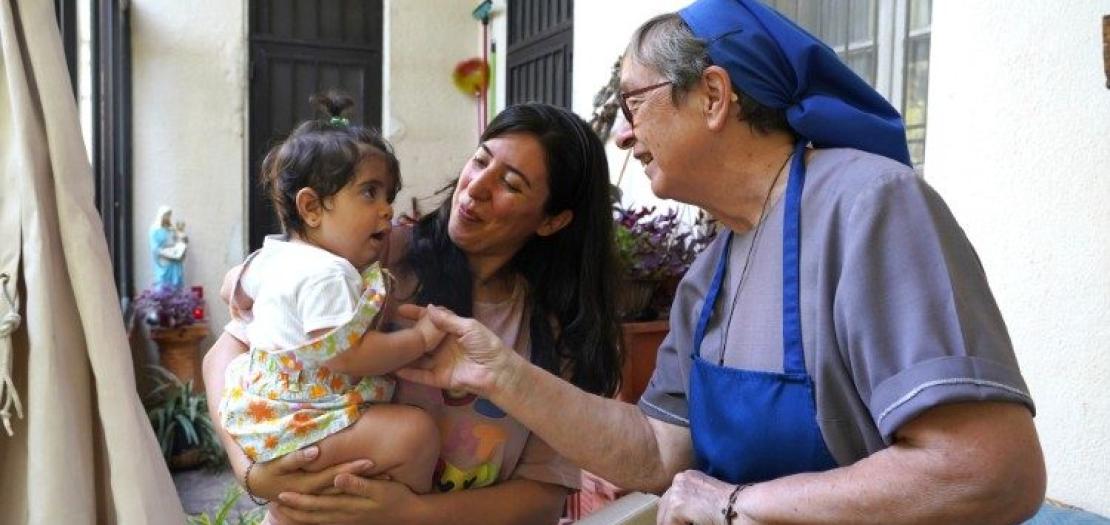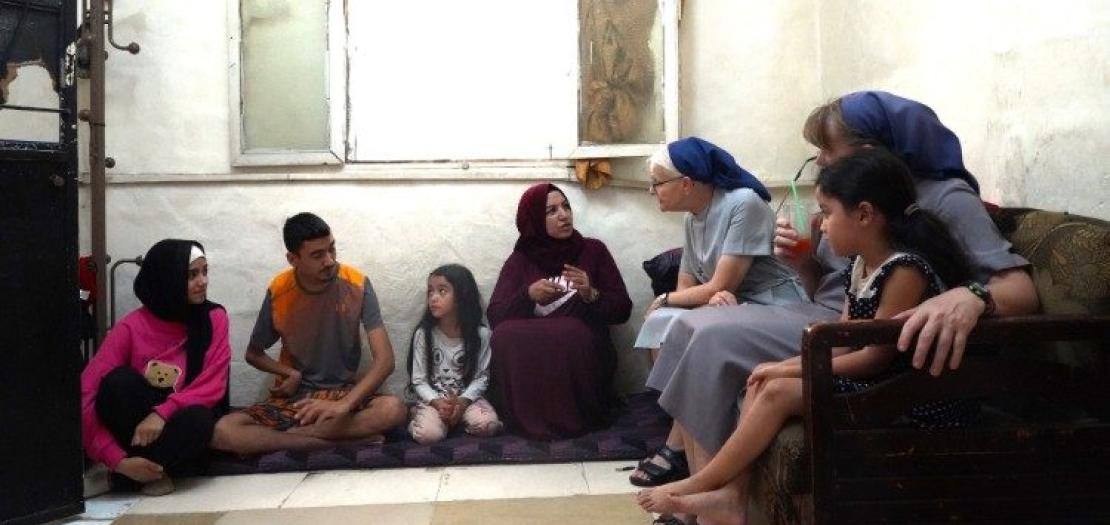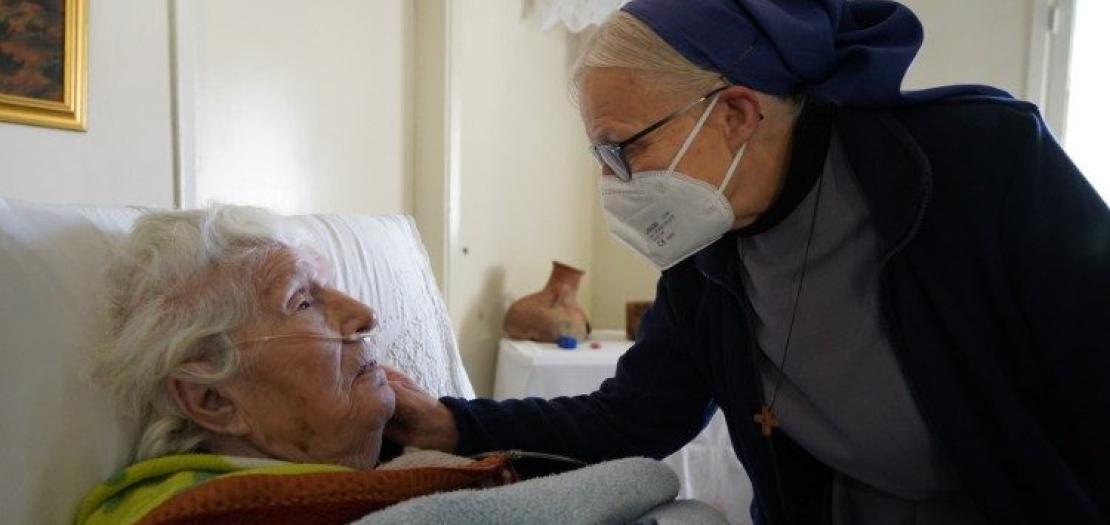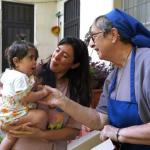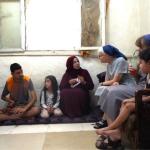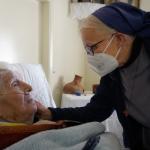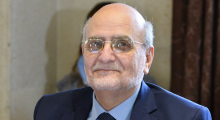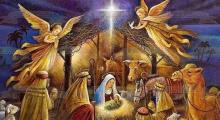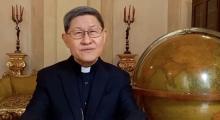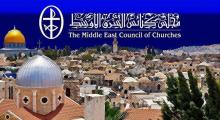Issued by the Catholic Center for Studies and Media - Jordan. Editor-in-chief Fr. Rif'at Bader - موقع أبونا abouna.org
This year marked the 75th anniversary of Pontifical Mission, founded as Pontifical Mission for Palestine, by Pope Pius XII in 1949 to care for the hundreds of thousands of Palestinians who were expelled from their native villages in the 1948 Arab Israeli War.
The pope entrusted the leadership and administration of Pontifical Mission to Catholic Near East Welfare Association (CNEWA). The work has since extended beyond the care of Palestinian refugees to those in need in the Middle East.
In Lebanon, among its many works, Pontifical Mission has supported the Palestinian refugee camp at Dbayeh, located about 12 km north of Beirut, since the camp was established in the early 1950s.
To mark the anniversary, ONE magazine, the publication of CNEWA, interviewed Sister Magdalena Smet, P.S.N., a member of the Little Sisters of Nazareth, who has been living and working among the refugees at the Dbayeh camp since 1987.
ONE magazine: Hello, Sister Magda. I thought we could begin with a short introduction to the Little Sisters of Nazareth, because there may be some viewers who do not know about your community. What is your mission, your charism, your spirituality?
Sister Magda: We are the Little Sisters of Nazareth, founded in Belgium in 1966. We are a branch of the great family of St. Charles de Foucauld. Our mission is to try to live like the Holy Family of Nazareth — to be a family presence among people who are disempowered, not always among the poor, but those who do not have rights, and also among the most vulnerable and the poorest, as these are the people whom the Lord loves by predilection.
Therefore, we try to express in some way the love of the Lord for the poorest — not through words but through our lives. This is the spirituality of St. Charles de Foucauld.
Q: And how did your community decide or discern to dedicate yourselves to the Dbayeh camp in Lebanon?
We have been here in this camp in Dbayeh since September 1987, thanks to Pontifical Mission. But, it’s quite a story — and the Lord directs the story of His people.
Before living in this camp, our community lived in another Palestinian camp. We arrived in Lebanon in 1970 and lived for three years in Bourj Hammoud, a very popular neighborhood. Then, I met, through my work at the factory — I worked as a Little Sister in a factory for a year — and there I met the large Palestinian community.
The factory was very close to a Palestinian camp — a fully Muslim camp, Tel Zatar [which no longer exists]. I didn’t know Arabic, but the women who worked in the factory were very kind. They took me to their homes. I didn’t understand much, but friendship and kindness don’t require words, so I would go.
After a year, I began studying Arabic. At that point, we said to ourselves: If we really want to live the spirituality of Charles de Foucauld, we must go toward these people who have been denied their rights for years.
We officially asked permission — at that time, it was the P.L.O. — to live in a camp. It was incomprehensible for politicians, but we were young then. Therefore, in 1970-1972, I completed my study of Arabic. We had difficulty obtaining permission. With the help of our bishop here in Lebanon, we obtained permission to live in a small Palestinian camp —smaller than Dbayeh — where Palestinian Christians and Muslims lived together.
We lived there for three years, and then war broke out. We were in the camp. We stayed a year there during the war. The camp was destroyed, as was our small community house. It was very small, very humble. We lived through an intense experience there — and the experience of losing everything.
While waiting to return — we no longer had anything — we lived in Jordan for a while, also among the Palestinian population, but not in a camp.
In 1987, during a visit to Lebanon, Pontifical Mission in Jordan in Amman asked us to deliver letters to Pontifical Mission here, and it was Sister Maureen, an American nun, who was here.
And she said, “I have been searching for a long time for religious sisters for Dbayeh camp.”
It was also our desire. It was also the desire of the bishop of Beirut, a Greek Catholic, to have religious women there. For us, this was the voice of the Holy Spirit telling us, “Come back.”
Q: Can you describe for us briefly daily life at the camp? What is your daily life like?
Yes. I would say daily life here is like that of any ordinary family anywhere. It is family life. Here in the camp, we see ordinary families, who fight to survive, who do not have an easy life, but with one big difference — they are Palestinian refugees. Refugees means that, somewhere, you have your country, your home, and these refugees are living here, waiting on their dream, their hope that one day they will return to their homeland. There are Palestinian families where there are still people who … remember some things about their country, and still have the key to their house.
Therefore, the situation is very difficult. They are refugees, their children are refugees, and their children’s children are also refugees. There is no light ahead of us.
We go from crisis to crisis, from crisis to crisis. And each time, when we think we will start to recover… but each day things get worse. Therefore, it’s about trying to find work, to find the means to send children to school and to survive.
Now we have a cease-fire, but not peace. We don’t have peace yet. This whole region is bubbling with a great desire, with the hope to rest a little. Daily life is difficult, very difficult — for adults, for the young, and for the children — for everyone.
For us Little Sisters, our life is the same as in every community: a life of work, prayer and above all, solidarity. We are part of this camp. This camp is our home, our family. Therefore, we live like everyone else, with the same possibilities, the same circumstances, the same desire to experience a little… to have a little rest from the situation.
Q: In fact, Sister Magda, this camp, which was supposed to be a temporary solution, seems to have become something permanent. How can we explain this?
To resolve the refugee problem, political decisions are needed. And that doesn’t depend on the people living here — and certainly not on us. We are Little Sisters, foreigners. We are three Belgian Little Sisters here. We hope with the refugees, walking with them, living with them.
Q: How can we understand what happens at the camp — where there seems to be no solution — in the light of the Good News of Jesus Christ?
It’s not easy. It’s not easy. I think, for us, it means living each day with a contemplative heart, trying to encounter the Lord in every situation: the joyful moments for families, joy in what surrounds us, aspects of creation, light, nature, but also in things that are difficult, and to accept, now and then, the absence of God in this life — a seeming absence — because we believe firmly that he is there, he is walking with us. Otherwise, after so many years, we wouldn’t still be here. It would not be possible.
Therefore, we need keep our attention, a strong focus, on: What is the Lord telling us through all this, as well as through people’s situations and problems? Each time, trying to discern how we can — drawing from him, from Jesus of Nazareth, from his Word — continue to speak, live and sometimes propose solutions, so families, people can continue to live.
We are three Little Sisters here. One Little Sister is like the mother of the family, who welcomes people, supports, prepares, cares for the home and offers hospitality. She also helps if people need clothing which we receive and distributes it.
Another sister is a trained nurse. She provides care for people here and offers home visits because there is no doctor living in the camp.
A large part of my time is spent listening with my ears and my heart — listening. We want people to have a place where they are welcomed as they are, and where they have the possibility and the time to share the interior life, to confide in someone and to trust that these things are kept, and I would say, kept in God’s heart because all this — we have a small chapel in our house here — all these worries that these people bring, we place them in the heart, in the hands of our Lord. And I think this allows the people, the families around us to keep their hope alive, because it is not easy. It is not easy.
Q: I can imagine. When we talk about the Palestinian camps, we often focus on the humanitarian needs of the people, but we don’t speak much about their spiritual needs. You shared how you provide, I would say, pastoral accompaniment to the people, through the ministry of listening.
Yes, very much so.
Q: Can you also share briefly other aspects of ecclesial and pastoral life in the camp? The faith of the people. Is there a parish for instance? Do people gather to pray together? What does this aspect of camp life look like?
Yes, originally, this camp was entirely Christian. Therefore, at the beginning, families requested and were given a church. We have a priest, our parish priest, and every Sunday we have liturgy.
I would say I admire the faith of these refugees, the faith of many of the people who live in this camp. There is this love for the Virgin Mary, who is a mother. I would say one of the most touching moments was, one day, when a mother in the camp lost her only son.
She came to our house, and she had just found out that he had died. We have outside, on the terrace, the statue of the Virgin Mary, with a candle that is always lit. This candle that burns is for all the people’s intentions — today, of both Christian and Muslim families.
This mother knelt before the Virgin outside and said a prayer, I would say, a theological prayer. A simple, simple, simple woman and she spoke to the Virgin, saying: “You understand, because you lost your only Son.”
Touching. This is the faith of the Christian families here. Perhaps a simple faith, but it is rooted in, connected to their daily lives. It’s not theoretical. It’s not a theory. It is life. Without this faith, many of them would not have survived.
Q: You mentioned earlier that the camp has opened up to other families. There are also Muslim families who live there now. How do the two communities live together?
In fact, it works rather well. They respect each other and each other’s religion. We don’t have any problems. And what is very, very beautiful and touching for us is that if there are relationships… I mean, to have good relationships between people, it requires time. That’s why it’s such a grace to be able to live for so long in the same place. They respect each other and their differences. That’s for sure. And when there’s a relationship… even with us, they even ask for prayers from us.
When the earthquake happened in Syria, there were people here, [Muslim] families who lost loved ones... they asked for prayers. And the Virgin, for these Muslim families, too, it’s Mariam, yes, it’s Mariam, too. So, for them as well. We are not competitors, not at all.
And we have the feeling that when we are true believers, we feel very close. There are no barriers there, and it’s very beautiful. They don’t have mosques here, but they are respectful. The priest organized an evening of prayer for peace, and Muslim families came to the church.
Q: Can you speak about the role of Pontifical Mission in the camp and how Pontifical Mission helps you, as a religious community, but also life at the camp? What’s the contribution of Pontifical Mission?
Yes, at the beginning Pontifical Mission helped us to accomplish our mission here.
And we are an exception as a fraternity, but by living with the people here, the families here, and seeing the needs of the families… It’s like when you see your sister in need, you are going to help your sister. And for us, every person you meet or who lives around you, it’s as if St. Charles de Foucauld is telling us: “This is your brother, this is your sister.” I cannot bear to see my sister die at the door of the hospital because there’s no money. At that moment, I would beg because she is my sister. It touches me. So, for all this care, medical care, for buying medicine, for all of that, where shall we go? It is Pontifical Mission that helps us regularly.
We saw all the children who were hanging around here. We said these children need to receive a bit of catechesis. They need to be prepared for their first Communion. And the children need to play, to be somewhere. Pontifical Mission helped us with some spaces to gather the children and give them catechesis. If I am in need, I know I have a home. For us, it’s a life of grace, but it’s a hard life. If we have questions, if we need support, if we need to be encouraged, if we need a home, for me, that home is Pontifical Mission.
We have many problems here in the camp, and life presents many challenges and every year, the problems multiply. Each year, the problems increase. Now, we are in a ceasefire, but in times of conflict, everything, everything is dark. So, we constantly have to seek the light and believe that there is light.
And there are the medical needs. The whole medical side — a huge, huge problem. People wait too long to see a doctor. The costs are high. The consultations are expensive, the exams are expensive, everything, everything is expensive. Diseases are not detected quickly. So, they reach a very advanced stage, and often it’s too late, and it leads to death. We have many such cases.
In addition, there’s the issue of educating our children. It’s a child’s right to go to school. It’s a child’s right to study. Here, without external help, three-quarters of our children would be on the street or would be working honestly, especially the Palestinian children, because for Lebanese children, there is public school. Now with the war, maybe school will start again a few days a week.
So, schools are needed. We don’t have a school in this camp. There was a very good school that was destroyed during the war. So, we need a lot of help to get our children into school. This is a huge, huge concern for the families, but also for us because they are our children.
Q: To conclude, Sister Magda, what do you think is the message we can share with our viewers to perhaps inspire them to solidarity, to inspire them to love their sisters and brothers in Lebanon who are suffering? What is your message as we close?
I would first say thank you. This is a big thank-you to Pontifical Mission. And it’s a big thank-you because it’s the thanks of all the people here. I don’t think there’s a single house here right now that hasn’t been helped by Pontifical Mission, that’s for sure. So, above all, a big, big thank-you is extended from the hearts of so many people.
The second word is not my word. It’s the Word of our Lord who says, “Whatever you have done and whatever you do for one of these little ones, for one of my children, you do it for me.” I think those are the only words to say.


